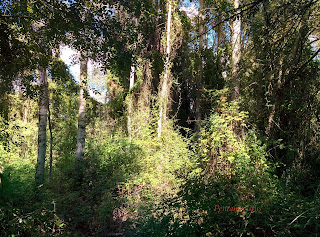Communing with a genius loci: a basic rite
In the countryside around my grandmother’s village in southern Portugal, there is a unique and beautiful grove (pictured above), full of birch trees which, while not entirely unheard of, are extremely rare in this otherwise dry Mediterranean region. On visiting it over the years, I have been struck by its lush beauty - it truly gives the impression of a ‘natural temple’, and is a wonderful spot for meditation (though in summer, the countless insects make this very challenging).
I eventually decided to
perform a ritual there (summer 2016), offering wine and incense to the local deity in
traditional Mediterranean fashion, and communing with it. At the end of the
ritual, I hoped for a sign that my offering had been accepted so I could leave
(the numerous insects flying around me were making the stay rather difficult).
At that point, a piece of bark fell from a tree directly in front of me,
falling loudly about 6 feet from where I was kneeling. I took that as a sign
that the ritual was successful.
Here is the ritual I
performed, with some additions. I recommend this as a first time ritual for
anyone interested in communing with nature, more specifically the genius loci or numinous presence that may abide in a specific area. I based it on a Roman
ritual for thinning a grove, and on the rites found in the Umbrian Iguvine tablets.
Required: red wine, some food
(bread, fruits or seeds), a stick of incense. Be sexually abstinent for at
least 24 hours beforehand.
a. Pick a spot you wish to work
in, wherein you feel numen may be present, and perform a short meditation
b. Light some incense
c. Dig 2 small trenches into the
soil (do not use metal for this) [1], and kneel
d. Pray:
Whether Thou be God or Goddess
to whom this grove is dedicated, as it is Thy right to receive due thanks and
offerings for permitting me entry into Thy sanctuary, may it be rightly done.
To this end, in pouring out this wine offering I render Thee homage. Do Thou
receive this humble libation.
Pour the wine into the trench.
Then take the food and pray thus:
Thee I invoke as the one
invoked, O God or Goddess, with this second offering, thereby praying that if
in this rite there hath been any omission, any sin, any transgression, any
damage or profanation of Thy holy place, any seen or unseen fault in my
offering, O revered one, if it be right, with this food as a second expiatory
offering may purification be made. And do Thou (state your petition, e.g.
guide me, keep me safe, my loved ones, my friends). Be Thou favourable O God or
Goddess, Thee I invoke.
Throw the food into the second
trench, and commune for a while. Watch for signs or omens that your offering
has been accepted. When you are done, rise, bow, and leave the area without
looking backwards.
[1] In ancient Rome, iron was proscribed in sacred groves, presumably because of its association with war and weaponry (and consequently bloodshed). Recently, Aaron Leitch also proposed that the mining of iron may be equivalent to rape against the earth, making it anathema to nature spirits
[1] In ancient Rome, iron was proscribed in sacred groves, presumably because of its association with war and weaponry (and consequently bloodshed). Recently, Aaron Leitch also proposed that the mining of iron may be equivalent to rape against the earth, making it anathema to nature spirits
Originally published in the Hermetic Tablet in the context of a larger article on nature and its role in religion




Comments
Post a Comment